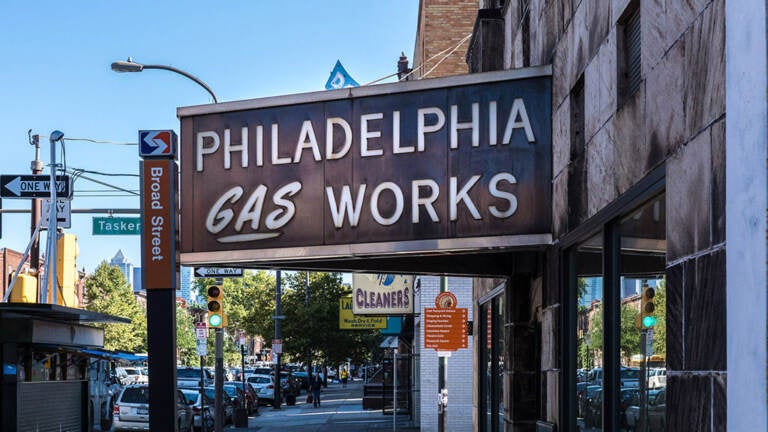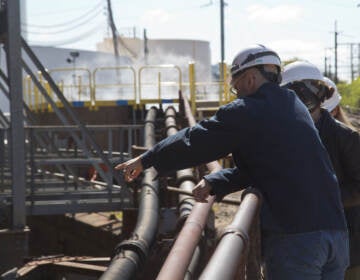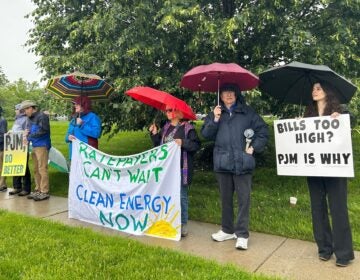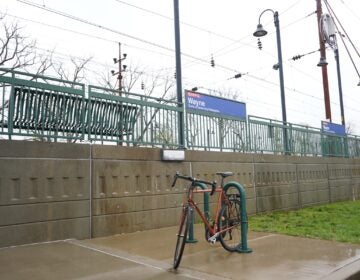PGW must justify its 1,000% rate increase for Philly’s steam loop, Public Utility Commission orders
The battle between rival Center City heat providers has climate implications.

A Philadelphia Gas Works sign is pictured on South Broad Street. (Danya Henninger/Billy Penn)
This story is part of the WHYY News Climate Desk, bringing you news and solutions for our changing region.
From the Poconos to the Jersey Shore to the mouth of the Delaware Bay, what do you want to know about climate change? What would you like us to cover? Get in touch.
The Pennsylvania Public Utility Commission has weighed in on a dispute between two rival Center City heat providers in a case that could have climate implications.
The commission this week ordered the city-owned Philadelphia Gas Works to conduct a rate case to justify its proposed 1,000% rate increase to Vicinity, current owner of the city’s steam loop system. That justification must be based on actual costs.
The PUC also ordered an investigation of the utility by the commission’s Office of Investigation and Enforcement into whether PGW has complied with the Commission’s previous order to “do a cost-based analysis” in other rate cases involving Vicinity.
Currently, the Vicinity co-generation plant in Grays Ferry burns natural gas transported through a pipe that is owned and operated by PGW. Vicinity uses that gas to generate steam, which is sent through its network of underground pipes to heat Center City office buildings and the University of Pennsylvania. The system is referred to as the “steam loop.”
Unlike power plants that simply burn a fuel source to generate electricity, co-generation makes use of the waste heat to also produce hot water, chilled water, and in this case, steam. Co-generation is therefore more efficient.
Vicinity says it has plans to move away from natural gas altogether through the use of thermal energy generated by Schuylkill River water, something it says could help Philadelphia reach its goal of net zero carbon emissions by 2050.
But those plans would be upended, the company says, if PGW successfully increases the charge for transporting the gas through its pipe.
“They want to put the squeeze to us,” said Vicinity CEO Bill DiCroce.
DiCroce says PGW is also poaching its customers by giving them a deal on new gas-fired boilers. One site that has decided to make the switch to gas boilers is Independence Hall. Amtrak’s 30th Street Station is also considering a switch.
“They come in and try to jack our rates up unilaterally, dramatically, to try to make us less competitive, because we’re going to have to pass that through to our customers,” said DiCroce. “So they want to feed more people with gas boilers. We want to feed them with our cogeneration and ultimately renewable based steam.”
PGW declined to comment on the Commission’s decision.
The bulk of Philadelphia’s greenhouse gas emissions come from buildings. And while emissions from that sector have dropped by about one-third between 2006 and 2019, the city attributes this to improved efficiencies in appliances and increased renewables powering the electric grid. The city wants to reach net zero carbon emissions by 2050, which would be difficult as long as buildings continue to be heated by natural gas.
PGW informed Vicinity of the rate hike in February 2021. Vicinity filed a complaint with the PUC in October of that year, alleging predatory and anti-competitive behavior. Meanwhile, Vicinity offered to buy the pipeline used to transport its gas for $10 million along with paying a higher rate for winter transportation, but it says PGW rejected its proposal.
The original case was heard by an administrative law judge, who ruled in PGW’s favor. Vicinity appealed the decision to the commission.
In the case, PGW argued that Vicinity gets a cut-rate deal for the use of its pipeline, which was negotiated 25 years ago and expired at the end of 2022. As a result, PGW said other ratepayers subsidize the steam loop system $250 million annually, and it wants to raise the fee Vicinity pays for distribution.
The commission rejected that argument, stating PGW’s current stance contradicts everything the gas company has said in past rate-making cases. The PUC said Vicinity relies on one dedicated pipeline and does not utilize PGW’s distribution system, which serves all the other ratepayers.
“We’re going to be vindicated in the end,” said DiCroce. “It could be a case where our rates actually go down.”

Get daily updates from WHYY News!
WHYY is your source for fact-based, in-depth journalism and information. As a nonprofit organization, we rely on financial support from readers like you. Please give today.







